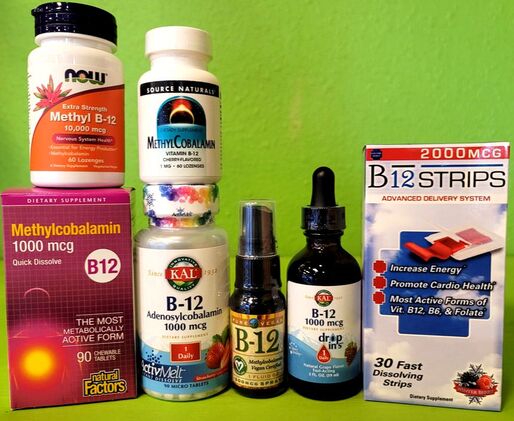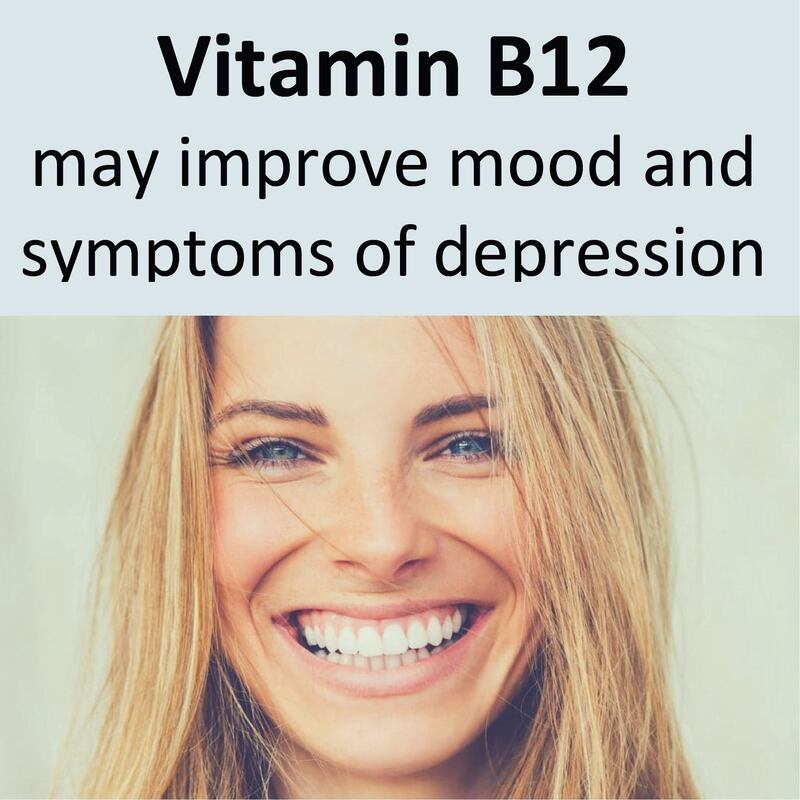|
The B vitamins are all important for your mood, nervous system, digestion, energy levels... well, they’re important for every system in your body! Let’s take a closer look at one of the b vitamins: Vitamin B12! B12 is necessary for the metabolism of every cell in your body. It is necessary in the creation and synthesis of DNA and red blood cells. If you are deficient in b12, you will feel systems in your body acting sluggishly or poorly. Low b12 can be a cause of memory loss, psychiatric symptoms, certain types of anemia such as megaloblastic or pernicious anemia, chronic fatigue, poor digestion, nervous system conditions, and many others. The best way to know if you are deficient is to ask your doctor for a test. You can be directly tested for b12 levels in your blood, but there are other signs of a b12 deficiency on a Complete Blood Count test. Ask your doctor to explain your results. It might be possible to get enough b12 from our diet. It is mostly found in meat, eggs, seafood, and dairy. Because it is mainly found in animal-based foods, it is much harder for vegetarians and vegans to get enough from their diet. They can get b12 from certain mushrooms, nutritional yeast, bee pollen, and fortified food products like cereal or non-dairy milk. (The trouble with fortified foods is that the cyanocobalamin form is often used for the fortification. Learn more about this form by reading below.) “The following factors may put you at a higher risk of not getting enough vitamin B12 from diet alone: Supplementing with b12 is the easiest and most effective ways to get enough. A sublingual supplement is the best way to supplement b12 because dissolves under your tongue, where it goes directly into your bloodstream instead of being digested by your stomach. Stomach acid can destroy some of the b12 in an oral supplement, and what you do absorb from an oral supplement will take longer to get into your blood stream where it can start working for you. That is why the b12 in your multivitamin might not be enough, especially if it does not contain the best type for you. There are 4 types of B12 available as a supplement, and each have their benefits. B12 is cobalamin, part of the metallic element cobalt. It is the only vitamin that contains a metal ion, which makes it a complex vitamin. We cannot digest cobalt, so the cobalamin in it has to be bound to a molecule, called a donor, that makes it digestible. 4 different donors are used to make 4 different types of b12 supplements: Cyanocobalamin: Cyanide is the donor in this type, and this type is not found in food. This is the most widely available form of b12 because it is the cheapest to produce, and it is the most stable because it has the greatest attraction to cobalt. It has the lowest absorption rate of all the types, however, and your body must convert it to a different type before it can be used. It requires a methyl donor (explained in the next paragraph) in your body to remove the cyanide so that the cyanide does not become toxic to you, and then your body must convert the cobalamin to a useable form of b12. It is inefficient, not very effective, potentially toxic, and unnecessary because there are better forms of b12 available. The Methylation cycle in your body is the detoxification pathway for your DNA. To put it simply, your DNA requires methyl donors, which are typically nutrients, to push toxic substances like cyanide out of your body. These methyl donors could be in short supply depending on if we eat or supplement with enough, and they are needed for our DNA to function properly too. If our methyl donors are used to pull out toxic substances, there might not be enough left over for necessary functions in our bodies. “We all get cyanide into our systems – pollution, barbecue, bonfire, second hand smoke, even almonds. The body always has to detoxify it. By taking cyano B12, you’re further depriving your body of methyl groups, a natural antidote, an antagonist for toxins... Why would you try to improve your health with something that requires the depletion of other crucial substances? It makes no sense, especially when there are other, better forms of vitamin B12 that don’t cost much at all. ” Methylcobalamin: A methyl donor is present in this type, making it an active type of b12. This means it is ready to be absorbed by the body. It does not require your body to supply a donor to use it, so it will not deplete you of donors, unlike Cyanocobalamin. This form is not found in food, but our bodies convert cobalamin in food to this form with the use of methyl donors. Because a methyl donor is already bound to the b12 in this form, it will not use up methyl donors in your body to be used. This form of b12 is immediately ready to get to work in your body without any binding or conversion. This is a highly absorbable form that is affordable, and that is why you will see this form widely available on our shelves. Methylcobalamin specifically has been studied for use in repairing nerves in degenerative nervous system conditions and in the case of peripheral neuropathy. Ultra-high dose methylcobalamin promotes nerve regeneration in experimental acrylamide neuropathy - PubMed (nih.gov) Adenosylcobalamin: This is another active form of b12, so it will be absorbed quickly by the body. Like methylcobalamin, our bodies will convert cobalamin from food to this form as well. One difference from the methyl form is that adenosylcobalamin is found naturally in food, especially in meat, making it the most common form of b12 in our bodies. This form plays a direct role in the creation of energy in your mitochondria. It works with enzymes and amino acids to keep your mitochondria healthy. A deficiency in adenosylcobalamin can be a cause of poor mood, chronic fatigue, nerve pain, muscle weakness and pain, liver damage, and more. “In the mitochondria, adenosylcobalamin is a chemical building block of the enzyme methylmalonyl-CoA mutase. This enzyme is responsible for the transformation of methylmalonyl-CoA to succinyl-CoA, which in turn is part of the citrate cycle. The citrate cycle is a central metabolic process, which generates adenosine triphosphate (ATP) – the universal energy provider in the human body (2, 3). A deficiency of adenosylcobalamin hence leads to the impairment of ATP production and, as a result, to chronic fatigue and exhaustion, muscle weakness, weight loss and developmental disorders.” Hydroxocobalamin: This is an inactive form of b12 that is found in foods. This means our bodies will convert it to either methyl or adenosylcobalamin for use, but unlike cyanocobalamin, it does not have a toxic donor that must be detoxified. The advantage of this type is that is has a long half-life, so it can stay in our bodies for a while without getting flushed out, and then our bodies can convert it for use when needed. This also means that it is a slower absorbed form, and may not provide the quick energy boost or symptom relief that the methyl or adeno forms offer. When to take b12? B12 supplements will give you energy. You will often find it as a featured ingredient in energy drinks for this reason. Therefore, it is best taken earlier in the day when you could use the energy boost. Avoid taking it at night because it can prevent you from sleeping, but taking it during the day can improve your sleep at night because it supports a healthy circadian rhythm. How much b12 should I take? This depends on your lab results, age, ability to absorb and convert b12, chronic illnesses and genetic mutations. You can follow the instructions on the supplement facts on your bottle, which will tell you the recommend daily allowance. This is the amount that is considered best for maintaining healthy levels of b12 daily, but if you are deficient a higher amount could be necessary to improve your levels. B12 is water-soluble. Your body will simply excrete out the excess that it does not need, so there is no concern on taking too much unless you take too much of the cyanocobalamin form (because your body will have to detoxify the cyanide in it.) Author: Sarah Langer
0 Comments
Leave a Reply. |
AuthorThe Health Squad is here to help guide you through this crazy chemical and toxin ridden world. We will provide tips to living a more natural lifestyle. Archives
January 2023
Categories |




 RSS Feed
RSS Feed